
Teresa of Ávila, also called Saint Teresa of Jesus, was a Spanish noblewoman who was called to convent life in the Catholic Church. A Carmelite nun, prominent Spanish mystic, religious reformer, author, theologian of the contemplative life and of mental prayer, she earned the rare distinction of being declared a Doctor of the Church, but not until over four centuries after her death. Active during the Catholic Reformation, she reformed the Carmelite Orders of both women and men. The movement she initiated was later joined by the younger Spanish Carmelite friar and mystic John of the Cross. It led eventually to the establishment of the Discalced Carmelites. A formal papal decree adopting the split from the old order was issued in 1580.

The Imitation of Christ, by Thomas à Kempis, is a Christian devotional book first composed in Medieval Latin as De Imitatione Christi. The devotional text is divided into four books of detailed spiritual instructions: (i) "Helpful Counsels of the Spiritual Life", (ii) "Directives for the Interior Life", (iii) "On Interior Consolation", and (iv) "On the Blessed Sacrament". The devotional approach of The Imitation of Christ emphasises the interior life and withdrawal from the mundanities of the world, as opposed to the active imitation of Christ practised by other friars. The devotions of the books emphasise devotion to the Eucharist as the key element of spiritual life.
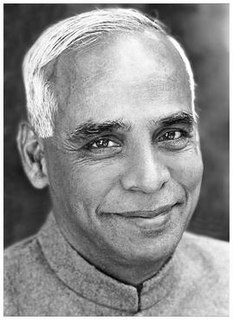
Eknath Easwaran was an Indian-born spiritual teacher, author and translator and interpreter of Indian religious texts such as the Bhagavad Gita and the Upanishads.
The anonymous text that is usually called the Prayer of Saint Francis is a widely known Christian prayer for peace. Often associated with the Italian Saint Francis of Assisi, but entirely absent from his writings, the prayer in its present form has not been traced back further than 1912. Its first known occurrence was in French, in a small spiritual magazine called La Clochette, published by a Catholic Church organization in Paris named La Ligue de la Sainte-Messe. The author's name was not given, although it may have been the founder of La Ligue, Father Esther Bouquerel. The prayer was heavily publicized during both World War I and World War II. It has been frequently set to music by notable songwriters and quoted by prominent leaders, and its broadly inclusive language has found appeal with diverse faiths encouraging service to others.
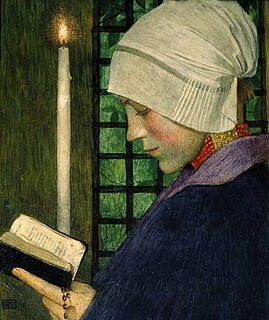
Christian meditation is a form of prayer in which a structured attempt is made to become aware of and reflect upon the revelations of God. The word meditation comes from the Latin word meditārī, which has a range of meanings including to reflect on, to study, and to practice. Christian meditation is the process of deliberately focusing on specific thoughts and reflecting on their meaning in the context of the love of God.
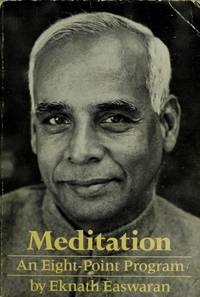
Passage Meditation is a book by Eknath Easwaran, originally published in 1978 with the title Meditation. The book describes a meditation program, also now commonly referred to as Passage Meditation. Easwaran developed this method of meditation in the 1960s, and first taught it systematically at the University of California, Berkeley.

Mental prayer is a form of prayer recommended in the Catholic Church whereby one loves God through dialogue, meditating on God's words, and contemplation of Christ's face. It is distinguished from vocal prayers which use set prayers, although mental prayer can proceed by using vocal prayers in order to improve dialogue with God. The practice of mental prayer aligns with that of vocal prayer, as prayer has traditionally been defined as "the raising of one's mind and heart to God."

Nonviolent Soldier of Islam is a biography of Khan Abdul Ghaffar Khan (1890-1988), an ally of Gandhi's in the Indian independence movement. Originally written by Eknath Easwaran in English, foreign editions have also been published in Arabic and several other languages. The book was originally published in the United States in 1984 as A Man to Match His Mountains: Badshah Khan, nonviolent soldier of Islam. A second edition was published in 1999 with the title Nonviolent soldier of Islam: Badshah Khan, a man to match his mountains. Both editions include an afterword by Timothy Flinders. The 1999 US edition contains a new foreword by Easwaran, and an enlarged section of photographs of Khan. The book has been reviewed in magazines, newspapers, and professional journals. The book inspired the making of the 2008 film The Frontier Gandhi: Badshah Khan, a Torch for Peace.

Gandhi the Man is a biography of Mohandas Karamchand Gandhi written by Eknath Easwaran. The book was originally published in the United States in 1973. Several subsequent expanded editions have been published. Non-English editions have also been published in several languages.

Essence of the Upanishads is a translation and commentary on the Katha Upanishad, an ancient Indian scripture. Written by Eknath Easwaran, the book was originally published in the United States in 1981, entitled Dialogue With Death. Non-English editions have also been published in several languages. The book has been reviewed in newspapers, magazines, and elsewhere.

The Mantram Handbook describes methods of using a mantram — sometimes called a Holy Name — in daily living. Benefits are also described. Written by Eknath Easwaran, the book was originally published in the United States in 1977. Several subsequent editions have been published, sometimes under different titles, in the United States, the United Kingdom, and India. Foreign (non-English) editions have also been published in several languages. The book has been reviewed in newspapers, magazines, and websites, and discussed in professional journals. It has also been a focus of scientific research. The subtitle of the fifth (2008) US edition is: a practical guide to choosing your mantram & calming your mind.
Carol Lee Flinders is a writer, independent scholar, educator, speaker, and former syndicated columnist. She received a doctorate in comparative literature from the University of California, Berkeley, with a focus on medieval women's mysticism.

The Dhammapada / Introduced & Translated by Eknath Easwaran is an English-language book originally published in 1986. It contains Easwaran's translation of the Dhammapada, a Buddhist scripture traditionally ascribed to the Buddha himself. The book also contains a substantial overall introduction of about 70 pages, together with introductory notes to each of the Dhammapada's 26 chapters. English-language editions have also been published in the UK and India, and a re-translation of the full book has been published in German. and Korean.

God Makes the Rivers to Flow is an anthology of spiritual texts for use in meditation, assembled by Eknath Easwaran. Condensed versions have been published under the titles Timeless Wisdom (book) and Sacred Literature of the World. First published as a book in the US in 1982, progressively enlarged or revised versions of God Makes the Rivers to Flow were also issued in the US in 1991, 2003, and 2009. English editions have been published in India, and a French edition has been published. The book has been reviewed in newspapers, magazines, professional journals, and websites, and utilized in research studies and education.
Mgr. John Palocaren (1886–1948) was the founding principal of St. Thomas College, Thrissur. Palocaren was born on 8 September 1886 in the Nadathara Palocaren family, an ancient Syrian Christian family of Kerala State, India. He was ordained as a minister in 1915, served at the St Thomas High School in Thrissur for three years, and was appointed the principal of St Thomas College when it was founded in April 1919. Soon after, he obtained MA in English Literature with distinction from the University of Edinburgh. In 1924 he returned as principal of St Thomas College, a status he retained until 1948. In 1937, he was awarded the status of Monsignor. Palocaren died on 19 August 1948. The 125th anniversary of his birth was celebrated at the college on 8 September 2011.
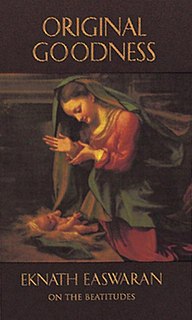
Original Goodness is a practical commentary on the Sermon on the Mount, emphasizing how to translate it into daily living with the aid of spiritual practices. Written by Eknath Easwaran, the book was originally published in the United States in 1989.

Seeing with the Eyes of Love by Eknath Easwaran is a practical commentary on The Imitation of Christ, a Christian devotional classic of the early 15th century, believed to be the work of Thomas à Kempis. Easwaran's commentary emphasizes how to translate the Imitation into daily living with the aid of spiritual practices. Seeing with the Eyes of Love was originally published in the United States in 1991. A German translation was published in 1993, and a second U.S. edition was published in 1996. The book has been reviewed in newspapers, magazines, and websites.
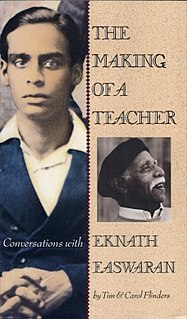
The Making of a Teacher is a spiritual biography of Eknath Easwaran (1910-1999). Written by Tim and Carol Flinders, the book was originally published in the United States in 1989. Adopting an oral history approach, the book recounts numerous conversations with Easwaran that describe his childhood, career as a professor of English literature, spiritual awakening, and service as a spiritual teacher in the United States. The book also profiles his current way of life, and relationship with his grandmother, his spiritual teacher. An Indian edition was published in 2002. The book has been reviewed in newspapers, and also excerpted.

Conquest of Mind is a book that describes practices and strategies for leading the spiritual life. Written by Eknath Easwaran, the strategies are intended to be usable within any major religious tradition, or outside of all traditions. The book was originally published in the United States in 1988. Multiple revised English-language editions have been published, and translations have also appeared in several other European and Asian languages. The book has been reviewed in newspapers and magazines.
The Vitakkasanthana Sutta is a discourse contained within the Pali Canon of Theravada Buddhism.















